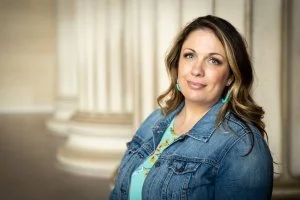On the face of it, 303 Creative v. Elenis, a case heard before the U.S. Supreme Court on Monday, sounded unimpressive.
A Christian web designer living near Denver was suing her state civil rights commission for the right to create wedding web sites without having to include creative content about same-sex weddings in the mix. She hadn’t been approached by any gay couples yet — but because she might be, she launched a pre-emptive lawsuit with the aid of the Alliance Defending Freedom, a law firm with an impressive track record of 11 wins at the Supreme Court level.
Yet, the more I read about the case and the issues it was trying to raise, the more intrigued I got. And the hearing on Monday didn’t disappoint. It lasted some two and one-half hours, which is long by Court standards. Covering hour-long hearings at the high court is difficult at best; I can only imagine how tough it was for reporters to sift through 150 minutes of speech — and all the tangents that were involved — to sum up how the hearing went.
Which is why I am merely critiquing the first drafts of what I hope will be more in-depth articles as time goes on. I’ll start with how CBS covered the story:
The Supreme Court's conservative bloc appeared sympathetic Monday to a Colorado graphic designer who argues a state law prohibiting discrimination on the basis of sexual orientation violates her free speech rights by forcing her to express a message that conflicts with her closely held religious beliefs.
During oral arguments in the case known as 303 Creative LLC v. Elenis, the court seemed to move closer to resolving a question it has left unanswered since 2018, when it narrowly ruled in favor of a Colorado baker who refused to make a cake for a same-sex wedding: whether states like Colorado can, in applying their anti-discrimination laws, compel an artist to express a message they disagree with.
An editorial comment: It's a minor annoyance that the plural “they” is used for a singular “artist.” Just write “he or she” for heaven’s sake.
One issue with reporting on this case is that it takes a ton of backstory to explain that this case isn’t just about a web designer, but also a cake designer-baker in a previous Supreme Court case.










